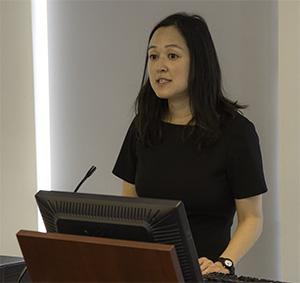Land Contracts Open a Window on Foreign Direct Investment
The New Website OpenLandContracts.org Promises to Become a "Game Changer" in a Columbia Campaign for Greater Transparency in Economic Development Deals
New York, October 26, 2015—In 2006, the Cambodian government awarded a 90-year land concession to a politically connected company backed by foreign investors. About 4,000 villagers lived on that land in the Koh Kong Province. The villagers claimed they knew nothing about the deal but were forcibly removed to make way for a sugar plantation. They charged the transfer of property was a land grab.
| Kaitlin Y. Cordes '08 of the Columbia Center on Sustainable Investment demonstrates the new database during a launch event involving a panel discussion of contracts and transparency. |
The resulting legal dispute, which has yet to be resolved, reflects the dangers common to investment projects in the world’s poorest countries. Outside investors can profit under contracts worked out with host governments, while taking land, food, or work opportunities from local residents who face worsening poverty and even threats of violence.
“International investment should improve livelihoods,” said attorney Kaitlin Y. Cordes ’08, a research scholar at Columbia Law School who leads the Columbia Center on Sustainable Investment’s work on land and agriculture. “The details of these deals are often unknown, but shedding light on them could prevent many of their associated problems.”
The Center’s new project— OpenLandContracts.org—is the first searchable online repository of large land, agriculture, and forestry contracts from around the world. Launched in partnership with the World Bank, it has grown out of another Center site, ResourceContracts.org, a database of mining, oil, and gas contracts developed with the Natural Resource Governance Institute. ResourceContracts.org will be re-launched this week at the Open Government Partnership’s Global Summit in Mexico.
By promoting greater contract transparency, these sites provide information necessary to judge the risks of displacement, food insecurity, and human-rights abuses that may arise from investment deals, Cordes explained, as well as to consider such environmental challenges as water diversion or pollution. They aim to help governments and citizens monitor agreements, protect the interests of all stakeholders, and ensure the enforcement of contract commitments, including promises for jobs or infrastructure.
“These sites help prove that disclosing contracts is feasible and beneficial and not problematic,” said Cordes. “Transparency can benefit everyone.”
The contracts available so far on OpenLandContracts.org and ResourceContracts.org have been culled from public sources, through the contracting parties, investor securities filings, and other online postings. Documents are available in English and French, and are being translated from other languages. Summaries of key contract terms have been provided by Center staff, law firms working in a pro bono capacity, and law or graduate students at Columbia, Harvard, and Tufts.
OpenLandContracts.org also includes a Guide to Forestry Contracts to assist users in understanding technical provisions and language (a Guide to Agricultural Contracts will be available soon). Sixty-nine contracts from eight African and Southeast Asian countries are now online, but Cordes expects to reach 100 agreements within the next few months. (ResourceContracts.org has more than 600 documents from 66 countries.) “There are many more contracts publicly available in the extractive industries than around agriculture and forestry,” Cordes said, “but we decided to start this site because we’re hoping it will serve as a mechanism for greater transparency in these deals.”
More countries are realizing that transparency works in their favor, as open land deals can face fewer troubles and governments want investments to spark broader economic growth and sustainable development. Liberia, for example, has become a leader in contract disclosure. Making contracts available for public scrutiny builds a climate of stronger accountability and trust, and many organizations—from the Committee on World Food Security to USAID to the United Nations—have issued guidance that calls for greater transparency around land deals. OpenLandContracts.org has developed a training module to assist users in assessing contracts, said Cordes, and this material will be on the site in early 2016.
“We are available to work with host governments that are interested in disclosing contracts but don't have the resources to do it themselves,” Cordes said. The Columbia Center on Sustainable Investment and its partners have already launched a stand-alone website for the West African nation of Guinea to disclose mining deals.
In the interest of spurring further innovation, OpenLandContracts.org will seek proposals from organizations and individuals for two $10,000 grants at the end of this year. “We're excited to see what different people are able to do with the site and what creative ideas they have to make it a vehicle for change,” Cordes said.
Funding for OpenLandContracts.org has been provided by UKaid from the Department for International Development. During an Oct. 7 launch at Columbia Law School, Lorenzo Cotula of the International Institute for Environment and Development called the new website a “game changer.”
“Our mission is to maximize the impact of international investment for sustainable development,” said Lisa Sachs ’08, director of the Columbia Center on Sustainable Investment. “For us, land contract transparency is a critical tool to ensure accountability, trust, and mutual benefit.”
